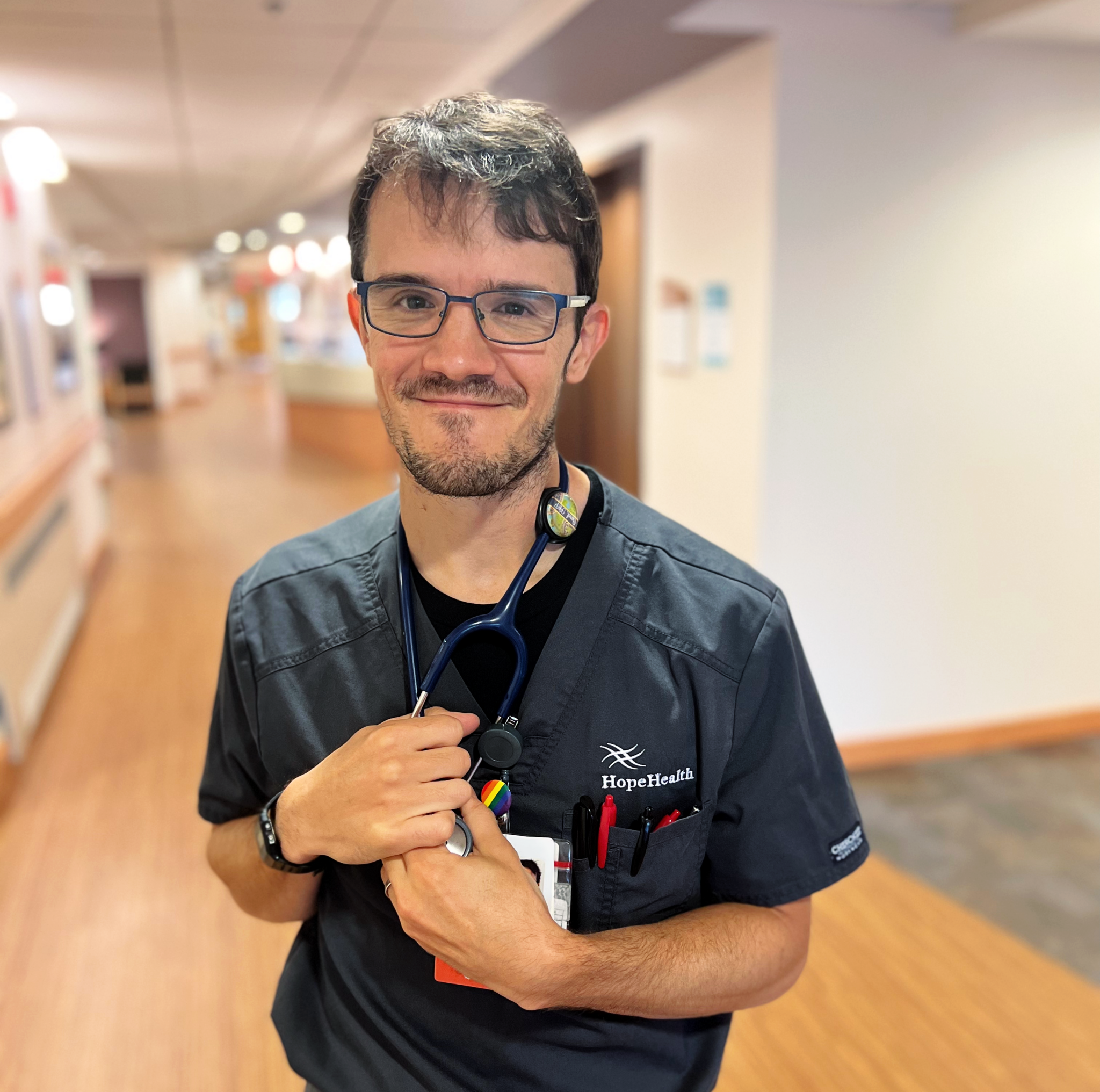Every time Justin Millan, RN, walks into HopeHealth Hulitar Hospice Center, he lets the rest of the world fall away.
“Everything else in my life disappears,” he says. “I go into a different mode.”
Between arriving and leaving each day, he bears witness to the death and dying process that so many others instinctively avoid. As an inpatient hospice nurse, he is at the bedside of individuals who are at the very end of life, with symptoms that are too complex to manage at home.
Along with the team’s doctors, nurses, social workers, chaplains, grief counselors and volunteers, he is in the room, or at the ready, as loved ones spend their final moments together.
Every day, he’s grateful he found this calling.
“We’re focused on the hour-to-hour value of giving patients peace, dignity and time with loved ones,” he says.
> Learn how to get started with hospice care.
”Death is part of life”
From his first day on the job at Hulitar Hospice Center, Justin knew he’d found his place. He’d spent the previous four years in a traditional hospital setting, racing from crisis to crisis. But in the halls of Hulitar, the lights were dim. The mood was contemplative. Patients and families had privacy, and peace.
“Coming to Hulitar shattered all of my expectations about what inpatient care looks and sounds like,” he says.
And the team had a way with patients and families that he’d never seen before. It boiled down to trust, earned and given amid the vulnerability of death.
“From my first day, I was impressed with how the staff spoke with the families,” he says. “They used the words death and dying. It wasn’t something to avoid. They didn’t try to redirect the conversation, or make false promises. Here, death is spoken about as a part of life.”
These aren’t easy conversations, but the relief is often visible on the faces of family members. “It’s one of the things that families thank us for the most — being direct with them,” says Justin.
”It humbles you”
“I have gotten to a place where I respect that death is this awesome natural force, on par with childbirth and with healing,” says Justin. “It humbles you.”
Throughout each shift, his focus is on two things: Clinically, what can he and the team do to ensure this patient’s final moments are comfortable? Emotionally, how can they support that patient’s loved ones?
In almost any other bedside setting, nurses are used to having a list of tasks that at times is mathematically impossible to get done in their shift. But at Hulitar, the team has open-ended time built into the day to do what’s best for patients and families. They can spend extra time with a patient who needs it, or sit with families to hold complex conversations.
“Working with patients who are in their last days of life might sound kind of bleak,” says Justin. “But to me, it’s the opposite. It’s uplifting. It’s gratifying. For many of us, inpatient hospice nursing is a chance to work in a bedside setting without the burnout.”
> Interested in becoming an inpatient hospice nurse? Click here to learn more and apply.
”I felt really good that we got to see him through”
Once, at the beginning of three consecutive 12-hour shifts, Justin’s team admitted an older man in heart failure. As they got the patient’s symptoms under control, it became clear that he was closing in on death.
But the family was not ready. “They were in different states of shock, with different ideas about what he needed. At times, there seemed to be some insurmountable conflicts,” says Justin.
Over the three shifts, Justin met with the family constantly, along with many other members of the inpatient team.
“We spent a long time just listening, letting them go wherever they wanted to go with their turmoil, grief, stress, anger. When they asked me questions, I would give the most objective answer I could. We developed a rapport, and trust,” says Justin. “It’s a process. Families want to see what you’re up to. They want to see how you treat their loved ones.”
By day three, the patient’s family had all gotten to a place of acceptance. That day, he passed peacefully with them by the bedside.
“I felt really good that our team got to see him through all the way, and be there for his family at the same time,” says Justin.
”At some point, it’s going to be me or my family”
When he thinks about what he takes away from his work every day, that feeling is part of it.
His own kids are 8 and 9. They know their dad works with dying people. At the end of most days, he tells them, in an age-appropriate way, about the work he does. He’s glad to give them a chance to learn, in a positive light, what he sees every day: Death is part of life.
As he shares these experiences, and reflects on their meaning, he often comes back to the people he works beside.
“It’s been very affirming and comforting to meet our other team members at Hulitar, who are so set on getting it right for the patients and families,” he says. “At some point, it’s going to be me or my family. It’s inevitable. Death is part of life.”

